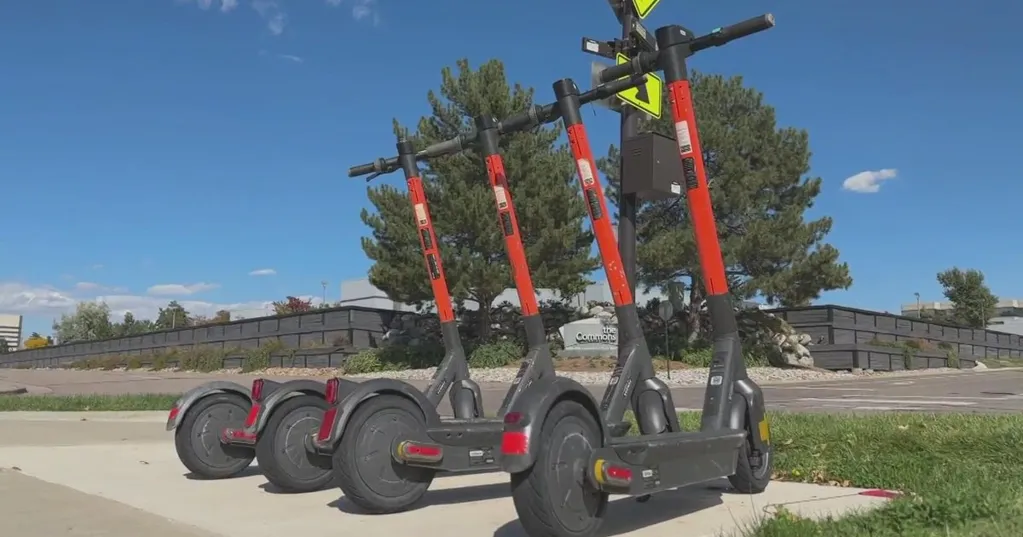Your Reporter Ashley Portillo specializes in coverage of Arapahoe County. Share you story ideas with her by sending an email to yourreporter@cbs.com.
While driving or walking in Colorado city's, e-scooters can be commonly seen cluttering sidewalks or right-of-ways. So there is a new initiative in some Arapahoe County communities to better track scooter and e-bike parking. The melding of transportation and parking technology is being applied to change how these vehicles take up shared urban spaces.
Spin scooters, Denver South and SparkPark are partnering together to launch a way to ensure e-scooters are parked in the proper places. Denver South is a group focused on transportation along the I-25 interstate and rail corridor south of Denver.
New micromobility parking technology from Spark Park is now available in areas that Denver South focuses on such as Greenwood Village and Centennial, where riders can currently ride Spin e-scooters. Spin is an e-scooter service provider based in San Francisco, and SparkPark is a Norwegian company that takes innovative approaches to city living already used in European urban spaces.
Jimmy Gilman, Spin's head of government partnerships, said scooter rides have doubled since launching the pilot program in April 2024.
"We're seeing that, in the data, a lot of ridership that trends towards commuters, lunchtime commuters who are going to and from restaurants, and the morning and evening commuters that are often connecting with transit and light rail," Gilman told CBS Colorado.
Since its launch, Spin has gone from 25 scooters in service to 50 scooters, and has also expanded the service area.
"Our goal is we're making sure that parking and clutter is not a concern in a program, while still providing that last mile connectivity," Gilman said. "We're all embracing of what we're calling sort of a hybrid method of micromobility, where we have these tech options that can validate user parking at a specific location, while in some less dense environments still providing the benefits of a free floating dockless model."
SparkPark uses the Bluetooth from e-scooters to track and confirm proper parking. Thomas Braaten, the co-founder of SparkPark, explained how the technology works. It's a stand-alone antenna that can be put anywhere. When scooter riders have finished their ride, they park the scooter in a set location near the antenna, and Spin can track and manage the parking of the scooters with high precision.
"It's wireless, and you keep it attached anywhere, and, by doing that, you can install a digital parking spot, and you cannot end the trip until our system tells it's a correctly parked vehicle," Braaten told CBS Colorado.
Braaten said parking spots can range up to 35 feet. He added the technology is saving companies and cities money.
"Compared to normal things like docks, huge docking stations, this is more scalable and faster, cheaper to install," Braaten said. "For cities that don't have the funding to do a huge e-bike or e-scooter program with racks installed, they could use our antenna and then create lots of parking spots," Braaten said.
During the first phase of the pilot SparkPark pilot program, data will be gathered on where people are parking. The pilot programs for Spin as well at SparkPark end in July 2026.
"They'll be able to see on the computer screen where folks are parked, how people are parking so that we can work on solutions, management and look at the data," said Daniel Hutton, Denver South's vice president of transportation and mobility.
Incentives will be created to ensure proper parking at the set locations moving forward.
"How can we incentivize riders to park in the right place? And, if they do that, that'll help save some operational costs we hope for SPIN," Hutton said. "We don't have a big clutter problem down here yet but there could be in the future with other providers. We want to make sure that we have ways of managing that."
